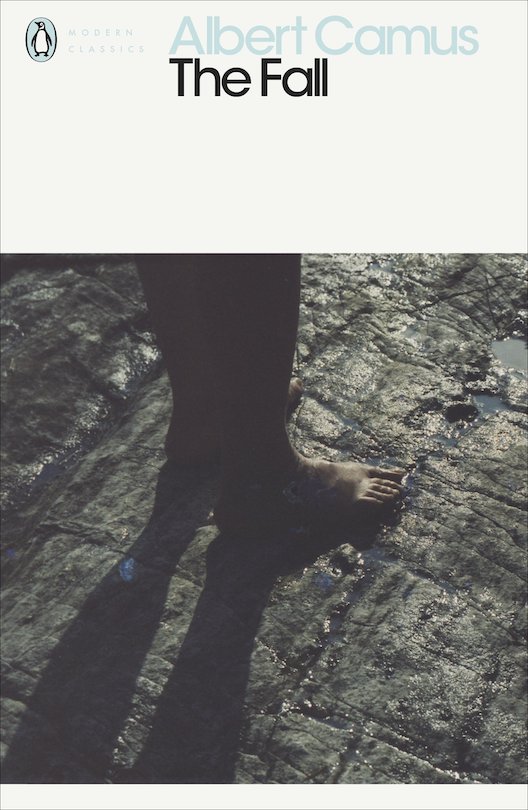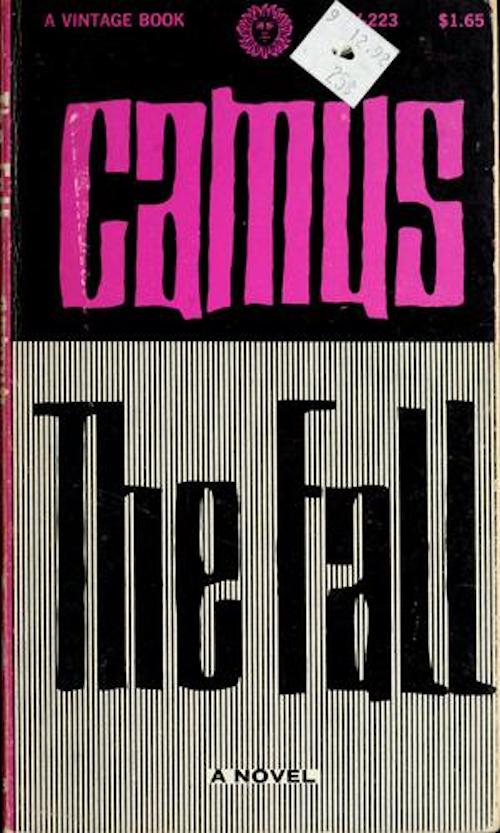After ’The Plague’ and ‘The Outsider’, ’The Fall’ (1956) marks my third Camus novel. And the first not to be set in his native Algeria, but… well, is that Paris or Amsterdam?
Though it’s the backstory in Paris that forms the spine of the narrative, this is not like those films that are one long flashback bookended by a brief framing device. Instead Camus repeatedly throws us back into the present. Just as soon as we might be getting used to Parisian life back we are in Amsterdam. And there seems to be two reasons for this.
First, the setting is established so a mood can be pinned to it. Which isn’t weekend break by the canals. In fact this so differs from our modern view of Amsterdam you need to imagine we’re in some fictional town which just shares the same name. Perhaps in France in those far-off days, it was seen as some rough-edged port you didn’t venture to unless bulk-buying Tulips. But it’s still remarkable how foreign it is here, somewhere where “life becomes denser, darker.” A stolen painting, searched for throughout the world, can be hung prominently in a harbourside bar, as if we’re somewhere in Patagonia.
And the Dutch play no greater role than the Arabs in the Algeria-set works, the book’s very structure denying them speaking roles. A grunting brute of a barman, devoid of any French, is the closest we come to a native character.
And this sense of being in an un-place, off the map is carried through into the sights. Or, more accurately, lack of them. The sheer absence of topography, the featureless flat landscape bordering the flat sea, is repeatedly evoked, the way a character can be brought back onstage to again pointedly say nothing. The limbo of Amsterdam represents the modern condition; we’re adrift in it, sailors without ports, bereft of landmarks by we could navigate.
“Isn’t it the most beautiful negative landscape?… A flabby hell, indeed! Everything horizontal, no relief: space is colourless and life dead. Is it not universal obliteration, everything nothingness made visible? No human beings, above all, no human beings!”
Second, this keeps alive the notion that the narrator, Clamence, is not writing but talking. Ostensibly, he’s talking to another character. But in effect his words pass right through the space they only formally occupy, with the result he is talking directly to us.
With dialogue that keeps incidentally describing the surroundings, it’s very similar to reading the transcript of a radio play. In fact, that medium might have even worked better. Camus’ sometime compatriot Sartre wrote about this aspect of radio in ‘The Reprieve’, where a young woman listens mortified to a Hitler speech…
”The great plain of Germany, the mountains of France, had dissolved, he confronted her as an absolute enemy, outside space, he was threshing about in that box of his – he’s looking at me, he sees me. She turned to her mother, to Ivy: but they had suddenly receded. She could still see them but not touch them. Paris had drifted out of reach, the light from the windows fell dead upon the carpet. Contacts between people and things were imperceptibly disintegrating, she was alone in the world with that voice… He was addressing her as though they two were alone, his eyes glaring into hers.”
A monologue on the radio feels like it’s been spoken straight at you. Even if others are in the room with you they become somehow marginal, for that voice is speaking to you. It can even feel like it’s already in your head.
And the novel needs this because of an essential difference to ’The Outsider’. There, Meursault made no attempt to persuade you of his way of thinking, he just asserted it and that was all. This time, Clamence is a devilish tempter. The novel becomes his book-length attempt to drawn you in, lure you over to his side, a tirade couched in soft words. (“So you know the Scriptures? Decidedly, you interest me.”) Amsterdam and its environs are the wilderness where the tempter always lurked.
The titular Fall he recounts is his own, from a successful and highly regarded defence barrister specialising in “widows and orphans” to someone who haunts seedy bars in Amsterdam. But as anyone who knows the story of Faustus will tell you, devils are nothing but fallen angels. The novel’s therefore full of inverted imagery; in a book titled ’The Fall’ he has a ceaseless desire to scale physical heights, he is a “judge-penitent”, declared a (kind of) Pope by compatriots because he is the most debased, and so on.
And the easiest route for fallen angels to take you is the one they have marked out themselves. His clever-sounding words, and his recounts of his actions, are like a breadcrumb trail leading to an abyss.
So he paints all virtuous acts as performative, helping a blind man cross the street only to bask in the gaze of onlookers and so on. And it tends to build from this banal-sounding example. Virtue really only exists in the eyes of others, therefore is ultimately self-serving.
Then, with no meaning to things, without the possibility of any genuine attachment between people, what is there left to hold off the ennui than turn life into a sport? Realisation of this is made to seem a form of sophistication. You, sir, unlike those others you are smart enough to get this.
I was surprised how many reviews portrayed Clamence as an abject character, his narrative one long confession to a non-existent Priest. They clearly read quite a different book to me! Why then, for example, would he be declared Pope? The relations are entirely the other way round, he is Mephistopheles to our Faustus. Try the following quote:
“After prolonged research on myself, I brought out the basic duplicity of the human being. Then I realised, as a result of delving in my memory, that modesty helped me to shine, humility to conquer, and virtue to oppose.”
Jimmy Maher calls this “a work absolutely drenched in Christian symbolism.” Which is the perfect phrase, as “drenched in” differs from “composed of”. Unsurprisingly for Camus, if the book borrows heavily from religion it is merely borrowing. Clamence is neither intended to be a Devil nor there to represent one, simply devilish in nature. We are used to talking about moral questions in religious terms, so Camus appropriates those terms. Just as questions of debts and obligations would translate more easily into Francs and Cents than Guilders.
As with the notion that ’The Plague’ was some kind of analogy for the rise of fascism, people are keen to see something of the post-War world at work in all this. You could indeed pen a tale about someone’s life of success and plenty being upended by Nazi invasion, causing their worldview to be rent in twain. Most likely, people already have. But that has nothing to do with this book.
True enough, there is one reference to Jewish people been taken from Amsterdam to the camps. But the claim soon reaches rather desperate levels. A bar named Mexico City is enlisted and turned into a reminder of the genocide against the Aztecs. As a bar of that name really existed, it seems more likely Camus went for some local colour than any such flight of fancy.
In fact the events which precipitate Clamence’s Fall precede, and are not at all associated with, the War. So instead of bombing raids and death camps, this Fall is strung along events such as a road rage incident, one so minor he acknowledges himself that those who witnessed it would soon forgot it happened.
To do otherwise would tie the novel to a specific era, when it wants to make its concerns more about the modern condition in general. Were it the War we’d soon be telling ourselves that people were driven to terrible things in those terrible times only to survive, and reassuring ourselves that we are lucky to be living now. There would be a barrier between us and the text.
Of course Camus is not Clamence, and his purpose isn’t to stop us helping the blind cross the road. In fact, the sequence where Clamence refuses to aid the Resistance, when Camus was widely known for taking the contrary course, seems to consciously oppose the two. The precis on GoodReads says:
“His… discomforting monologue gradually saps, then undermines, the reader's own complacency.”
And this seems pretty good description of authorial intent. I suspect you’re intended to go through a process, first considering shutting your ears, but finally decide to engage head-on with his anti-moralist tirade. His purpose is to expose and then burn away that complacency, all the false and performative actions until hopefully some core is left at the end which will hopefully be true meaningful action.
I found, however, I wasn’t reading things that way. I had a tendency to think “ah, the Devil, there he goes again”, like getting a repeat tele-sales call. True, he does a better job of setting out this stall than some alt.right nut baying about “virtue signalling”. But that’s just to talk about style. It can feel a little like getting a poet to pen a tele-sales script, it’s comes to be worded so much more evocatively but is ultimately still about flogging you wares.
Evil - at least to me - is not richly seductive, mellifluous in its malevolence. The effects of evil may be terrible. But evil itself is fundamentally banal. Donald Trump, for example, is someone rich and powerful who would like to become more rich and powerful than he already is. Less Mephistopheles spouting infernal wisdom, more a simple-minded boorish braggart. Falsehoods are not beautiful, as in the opening quote, but easy and cosy. Had Clamence approached me in a bar with his patter, I’d have just made my excuses. There’s better things to do in Amsterdam…



No comments:
Post a Comment